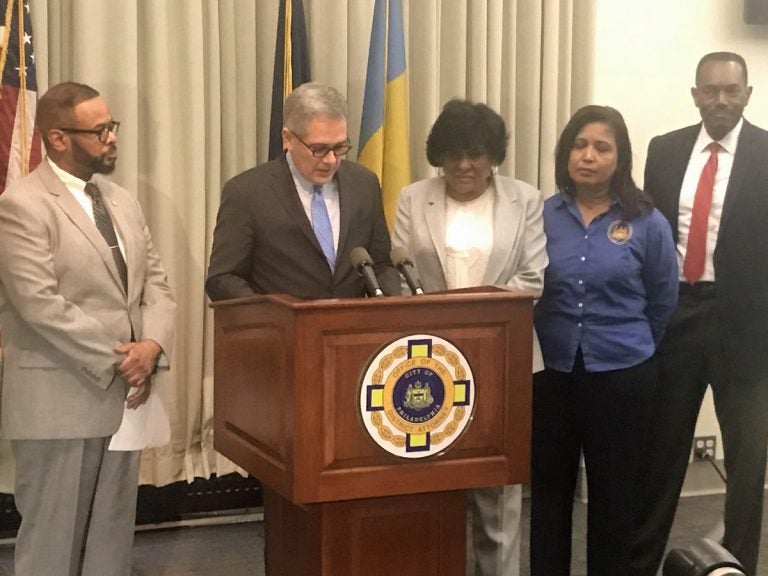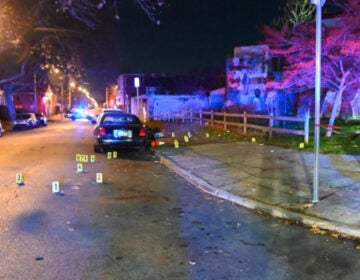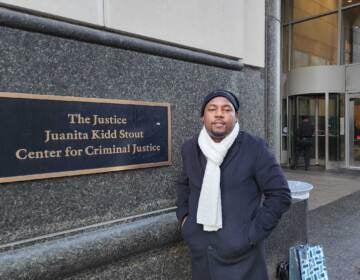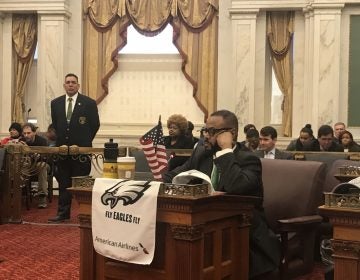New DA telling Philly prosecutors not to seek bail for defendants in low-level crimes
The policy shift is expected to affect defendants in thousands of cases, easing systemic bias against the poor and people of color.
Listen 2:18
Philadelphia District Attorney Larry Krasner announces that the city’s prosecutors will no longer seek cash bail for nonviolent defendants while they await trial.(Bobby Allyn/WHYY)
Calling the current cash-bail system “imprisonment for poverty,” Philadelphia District Attorney Larry Krasner announced Wednesday that the city’s prosecutors will no longer seek cash bail for nonviolent defendants while they await trial.
The policy shift does not end cash bail in the city — such an overhaul would require the state Legislature to act. But Krasner’s move to release defendants charged with low-level crimes ahead of trial is poised to affect thousands of cases annually. According to the city’s top prosecutor, it will also save taxpayers money and lessen some of the system’s bias toward the poor and people of color.
About 20 percent of those sitting in city jails are incarcerated for not being able to post cash bail, a statistic Krasner said illustrates that the system “picks on the poor.”
Standing alongside the city’s chief public defender, clergy members, and elected officials, Krasner said it is unjust to require those charged with crimes such as possessing marijuana, prostitution, retail theft, and driving while under the influence to meet cash-bail requirements.
“In many instances, the consequences of the person who can’t pay the bail is losing their job, having interruptions in their ability to provide for their families,” Krasner said. “Taking care of children, getting them to school.”
The policy shift comes weeks after Philadelphia City Council passed a resolution calling upon the Republican-controlled state Legislature to pass a law eliminating cash bail across the commonwealth, following the lead of New Jersey, which last year became one of the first states to virtually end its cash-bail system.
Some critics, Krasner said, might look at his proposal and argue that it will engender more crime or translate into fewer defendants showing up in court. But Krasner pointed to Washington, D.C., where the criminal justice system has done without cash bail for decades.
“The results have been that people show up for court at very high rates,” he said. “They very seldom commit new crimes while they are out of custody, and, even less frequently, are those crimes of violence. It’s a system that works.”
Krasner expects the new approach to affect about 4,000 cases a year — roughly 10 percent of the district attorney’s office’s annual caseload.
Pretrial bail decisions are still made by judges, but Philadelphia public defender Keir Bradford-Grey said judges will probably listen if prosecutors and defenders seek the same thing for a defendant.
“It would make no sense for them to disregard the two people who are really working closely with the individuals involved,” she said.
Krasner’s prosecutors will still be able to ask a judge to set cash bail in “exceptional” instances where a defendant has a lengthy criminal record or is considered a flight risk.
Bradford-Grey said it is a first meaningful step, but there is still a long way to go if Philadelphia wants to completely eliminate cash bail.
“I think we can move toward eliminating the cash part of our bail because remember, even dangerous people, if they can afford it, they can get out,” Bradford-Grey said.
Bradford-Grey said Krasner’s move is in step with a $3.5 million grant from the MacArthur Foundation that was awarded to the city in 2016 and aimed at reducing Philadelphia’s jail population —and one of the highest incarceration rates of any major U.S. city.
City Councilman Curtis Jones Jr., who sits on a committee focused on criminal justice reform, applauded Krasner’s policy shift.
“Bail is a 1,000-year-old proposition from medieval times,” Jones said. “Anything 1,000 years old probably could stand a tuneup, and possibly even a real overhaul, and I think we began that today.”
WHYY is your source for fact-based, in-depth journalism and information. As a nonprofit organization, we rely on financial support from readers like you. Please give today.




